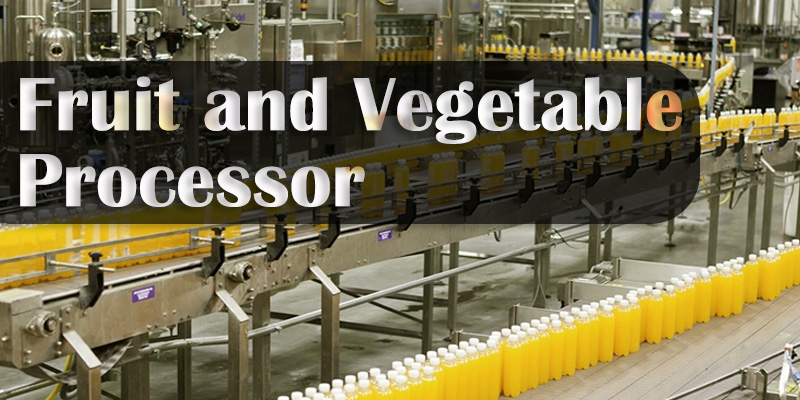
ITI Fruit and Vegetable Processor Trade Syllabus
The ITI "Fruit and Vegetable Processor" trade is a one-year vocational training program under the Craftsman Training Scheme (CTS), governed by the National Council for Vocational Training (NCVT). This course equips trainees with skills in processing, preserving, and packaging fruits and vegetables to extend shelf life and ensure quality for commercial use. The syllabus integrates theoretical knowledge, practical processing techniques, and employability training to prepare students for roles such as food processors, quality inspectors, or production assistants in the food processing industry, cooperatives, or entrepreneurial ventures.
Course Overview
- Duration: 1 year (2 semesters, each 6 months)
- NSQF Level: Level 4
- Eligibility: Minimum 10th grade pass (or equivalent)
- Objective: To train individuals in fruit and vegetable processing techniques, preservation methods, and food safety standards to meet industry demands.
Detailed Syllabus Breakdown
1. Trade Theory (Theoretical Knowledge)
Covers foundational concepts in fruit and vegetable processing and preservation.
- Semester 1
- Introduction to Food Processing
- Importance of fruit and vegetable processing.
- Types of fruits and vegetables: seasonal, perishable, non-perishable.
- Overview of the food processing industry and its scope.
- Raw Material Handling
- Selection and grading of fruits and vegetables: size, ripeness, quality.
- Storage techniques: cold storage, controlled atmosphere storage.
- Pre-processing: washing, peeling, cutting, blanching.
- Preservation Techniques
- Principles of food preservation: drying, canning, freezing.
- Use of preservatives: salt, sugar, vinegar, chemical additives.
- Spoilage factors: microbial growth, enzymatic action, oxidation.
- Food Safety and Hygiene
- Personal hygiene: hand washing, protective clothing.
- Sanitation in processing units: cleaning equipment, work areas.
- Food safety standards: FSSAI guidelines, HACCP basics.
- Basic Equipment and Tools
- Processing equipment: peelers, slicers, blenders, dryers.
- Measuring tools: thermometers, pH meters, weighing scales.
- Maintenance and safe handling of equipment.
- Introduction to Food Processing
- Semester 2
- Advanced Processing Techniques
- Canning: heat processing, sealing, sterilization.
- Freezing: quick freezing, cryogenic freezing methods.
- Dehydration: sun drying, mechanical drying, freeze-drying.
- Value-Added Products
- Preparation of jams, jellies, pickles, and sauces.
- Juice extraction and concentration: pulping, filtration.
- Packaging of processed products: bottles, cans, pouches.
- Quality Control
- Quality parameters: taste, texture, color, shelf life.
- Testing methods: pH, moisture content, microbial load.
- Defect identification: spoilage, contamination, packaging faults.
- Packaging and Storage
- Types of packaging materials: glass, plastic, metal, tetra packs.
- Labeling requirements: nutritional facts, expiry dates.
- Storage conditions: temperature, humidity, light control.
- Professional Skills
- Cost estimation: raw materials, processing, packaging.
- Entrepreneurship: starting a small-scale processing unit.
- Market trends: demand for processed fruits and vegetables.
- Advanced Processing Techniques
2. Trade Practical (Hands-On Skills)
Focuses on practical processing and preservation skills.
- Semester 1
- Raw Material Preparation
- Sorting and grading fruits and vegetables manually.
- Washing, peeling, and cutting using hand tools and machines.
- Blanching fruits and vegetables to preserve color and nutrients.
- Basic Preservation
- Drying fruits (e.g., mango, banana) using a dehydrator.
- Preparing simple pickles with salt and vinegar.
- Freezing vegetables (e.g., peas, carrots) in small batches.
- Equipment Handling
- Operating peelers, slicers, and blenders safely.
- Measuring temperature, pH, and weight of samples.
- Cleaning and maintaining processing equipment.
- Project Work
- Preparing a small batch of dried fruit or pickled vegetables.
- Documenting the process and quality observations.
- Raw Material Preparation
- Semester 2
- Advanced Processing
- Canning fruits (e.g., pineapple) in syrup with sterilization.
- Freezing juice concentrates using quick-freeze methods.
- Dehydrating vegetables (e.g., tomatoes) with mechanical dryers.
- Value-Added Products
- Making jams (e.g., strawberry) and sauces (e.g., tomato).
- Extracting juice from fruits (e.g., orange) and bottling it.
- Preparing pickles with spices and oil in bulk.
- Quality and Packaging
- Testing processed products: pH, taste, texture checks.
- Packaging products in bottles, cans, or pouches with labels.
- Storing samples under controlled conditions for observation.
- Project Work
- Producing a complete processed product (e.g., canned fruit or jam).
- Presenting a report on production, quality, and packaging.
- Advanced Processing
3. Workshop Calculation and Science
Provides mathematical and scientific support for processing tasks.
- Semester 1
- Arithmetic: calculating ingredient proportions, batch sizes.
- Chemistry: pH, acidity, and preservation reactions.
- Measurements: volume, weight, drying time.
- Semester 2
- Calculations: cost per unit, shelf-life estimation.
- Science: microbial growth control, heat transfer in canning.
- Physics: freezing rates, dehydration principles.
4. Engineering Drawing
Focuses on technical drawing for processing setups.
- Semester 1: Sketching layouts of processing equipment and workstations.
- Semester 2: Preparing diagrams for canning or packaging lines.
5. Employability Skills
Enhances job readiness and soft skills.
- Semester 1
- Communication skills: interacting with suppliers, customers.
- Time management: completing processing tasks on schedule.
- Basic IT skills: recording production data.
- Semester 2
- Entrepreneurship: planning a small processing business.
- Teamwork: collaborating in production and quality checks.
- Interview preparation: roles in food processing industries.
Assessment and Certification
- Examinations: Conducted semester-wise with theoretical and practical components.
- Certification: Successful candidates receive the National Trade Certificate (NTC) from NCVT, recognized nationally and internationally.
- Evaluation: Based on processing skills, product quality, theoretical knowledge, and project work.
Career Opportunities
- Employment: Food processor, quality inspector, production assistant in food processing units, cooperatives, or agro-industries.
- Self-Employment: Starting a small-scale fruit and vegetable processing unit.
- Further Studies: Diploma in Food Technology, Food Preservation, or Agro-Processing.
Note
- This syllabus aligns with the latest NCVT guidelines and may vary slightly based on institutional or state-specific requirements.
- For the most current version, refer to the Directorate General of Training (DGT) website (dgt.gov.in) or consult your local ITI.
Trade Type
- 11 views